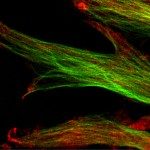Link to Pubmed [PMID] – 40169064
Link to HAL – pasteur-05017717
Link to DOI – 10.1016/j.ijpharm.2025.125535
International Journal of Pharmaceutics, 2025, 675, pp.125535. ⟨10.1016/j.ijpharm.2025.125535⟩
Carrier proteins are chemically linked to poorly immunogenic antigens to generate conjugate vaccines, significantly improving immunogenicity. CRM197, a genetically detoxified diphtheria toxin (DT) mutant carrying the G52E mutation, is a widely used carrier protein as it retains lysine residues for antigen conjugation. In the past, CRM197 has been expressed in Corynebacterium diphtheriae, but low yields and high costs have prompted the exploration of alternative expression systems. Although high-yield expression and native refolding of CRM197 in E. coli are challenging due to its reducing cytoplasm, recent advances have enabled the production of soluble and well-folded recombinant CRM197 proteins, namely EcoCRM® and EcoCRM®(-Met). In this study, we use Hydrogen/Deuterium eXchange Mass Spectrometry (HDX-MS) to compare the structural dynamics of EcoCRM and EcoCRM(-Met) with DT wild-type. Our HDX-MS data show that the presence or the absence of the N-terminal methionine does not affect the structural dynamics of the two recombinant EcoCRM proteins. Furthermore, our results elucidate the molecular mechanism underlying the lack of toxicity of CRM197 compared to DT wild-type: the G52E mutation in the CRM197 proteins exclusively alters the stability of the NAD-binding pocket and induces allosteric effects within the receptor-binding domain. Altogether, these insights support the substitution of CRM197 produced by C. diphtheriae with the recombinant EcoCRM and EcoCRM(-Met) proteins produced in E. coli, offering a cost-effective solution for use in conjugate vaccines. Data are available via ProteomeXchange with identifier PXD057388.





